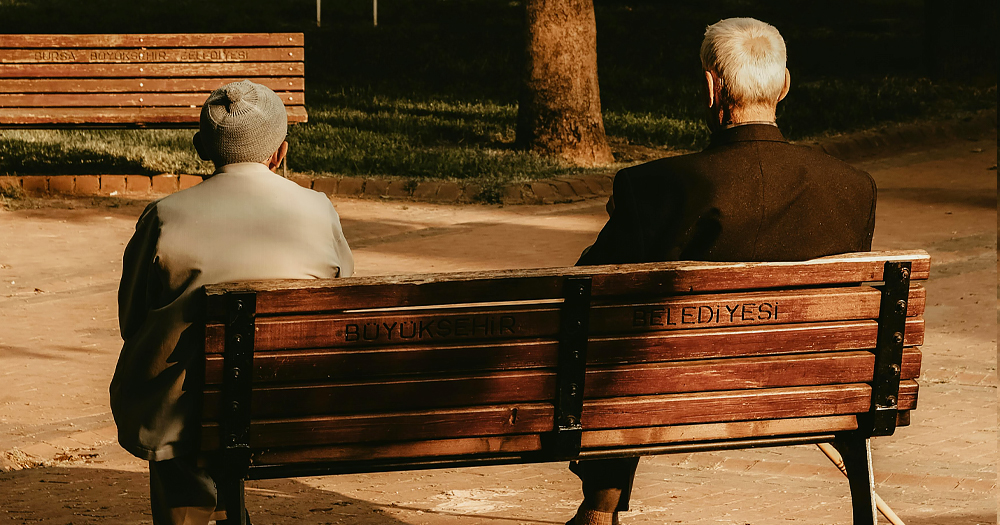GCN contributor Colin Daly reflects on how we can support older queer people who decide to embark on their coming out journey later in life.
I’ve written previously about age discrimination in the queer scene. It’s not a new subject; advising or suggesting how to tackle getting older. But what about people who are dealing with being older and who are also just coming out? Who are perhaps in their 50s, 60s, 70s or older and still afraid to do it?
When we think about someone who is yet to come out, the first thing that springs to mind is a teenager or someone in their early 20s. But there are people who don’t come out until later in life and they might be just as nervous and afraid of what they will encounter as their younger counterparts. Perhaps even more so.
When we meet an older person, we are inclined to think that they will have the maturity and life experience that will protect them from any or most emotional problems that the LGBTQ+ scene can throw at them.
Wordsworth wrote: “Bliss was it in that dawn to be alive, But to be young was very heaven!”
That’s the feeling of just coming out, of going to your first gay disco, experiencing your first gay kiss. But how young is young? Is it just temporal, a time in your life, or is it contextual? A period, fleeting and ephemeral in its novelty but forever life-changing?
Most people feel young, mentally, their whole lives. They often have lifetime interests and desires. For some older people, this includes fantasising about “coming out” after decades of shadowing the gay scene from a distance and getting ever more desperate to grab the euphoria that one feels when one finally does it. But some older people may well feel that it’s too late. That they have made their bed and must lie in it. This, however, should never be the case.
This is why it is vitally important to reach out to older people who are desperate to declare their sexuality and join the LGBTQ+ society, to inhale the emotional oxygen that this supplies and of which they have been desperately deprived. And what the community should do is welcome them in and guide them on a path to happiness, freeing them, finally, from the straitjackets and shackles of heteronormativity. But there is still work to be done in that regard.
To my knowledge, most “queer” information for older people is aimed at people who have already come out. At the same time, most information on coming out generally seems to be aimed at young people. But is there not a desperate need to reach out to closeted older people, no matter how old, so that they can engage with the friendship of other queers and finally be themselves?
The various Pride events happening around Ireland would seem to be an ideal occasion to reach out to these people. But even having attended massive Pride events in London, I don’t recall ever having seen a reach-out or a friendly organisation that seeks to engage with this part of the community. The unseen and unknown “community” of the closeted aged.
I can only remember having read one article years ago in a gay newspaper that addressed this same issue. It is the memory of that article that inspired me to write this. I don’t have the answers about how to give old people the confidence to come out of the closet after decades of hiding in there. But perhaps one of the many excellent charities could find a way to reach these queer siblings and give them the warm embrace of their LGBTQ+ family. It’s likely that some of them read GCN.
So, if you regularly see an older person who is always around the scene but never joins in or doesn’t seem to know anyone, then you might consider giving them a simple hello or other words of welcome. You may change their lives for the better, forever, and make a new friend for yourself. And it costs nothing to be nice.
© 2024 GCN (Gay Community News). All rights reserved.
Support GCN
GCN is a free, vital resource for Ireland’s LGBTQ+ community since 1988.
GCN is a trading name of National LGBT Federation CLG, a registered charity - Charity Number: 20034580.
GCN relies on the generous support of the community and allies to sustain the crucial work that we do. Producing GCN is costly, and, in an industry which has been hugely impacted by rising costs, we need your support to help sustain and grow this vital resource.
Supporting GCN for as little as €1.99 per month will help us continue our work as Ireland’s free, independent LGBTQ+ media.
